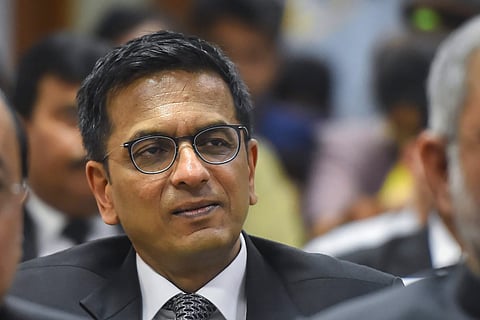

Justice Dhananjaya Y Chandrachud was sworn in as the 50th Chief Justice of India (CJI) on Wednesday, November 9 by President Droupadi Murmu. Justice Chandrachud succeeds former Chief Justice UU Lalit, who exited office on November 8 after a short tenure of 74 days. The newly appointed CJI will serve over a period of two years, a comparatively long window of time for a Supreme Court Chief Justice in recent times. Before being elevated as the CJI, Justice Chandrachud served as the Chief Justice of the Allahabad High Court and a judge of the Bombay High Court.
Here are five things to know about Justice DY Chandrachud, who will now head the Indian judiciary for the next two years.
Justice DY Chandrachud was born to Yeshwant Vishnu Chandrachud, the longest-serving Chief Justice in the history of India, and Prabha, a classical singer. A graduate of Mathematics and Economics from St. Stephen’s College, Delhi, he went on to pursue a career in law. He obtained a Bachelor of Laws from Delhi University and a Masters of Laws from Harvard Law School. Justice Chandrachud also completed a Doctorate of Juridical Science from Harvard in 1986, which focused on the various aspects of affirmative legal action. He was a recipient of the coveted Inlaks Scholarship and the Joseph H Beale Prize for scoring the highest in the Conflict of Laws course at Harvard.
On completing his legal education, Justice DY Chandrachud worked briefly at a law firm before returning to India. He enrolled as an advocate with the Bar Council of Maharashtra and practised at the Bombay High Court and the Supreme Court. As a lawyer, he always focused on issues pertaining to the common people. Some of his significant legal interventions include those in labour laws, especially pertaining to the loss of livelihood of labourers diagnosed with HIV-AIDS. He was also passionate about the legal conflicts faced by bonded women labourers and religious minorities.
In 1998, he was designated as a senior advocate, at the age of 38, a rare feat for practising advocates to be conferred this designation below the age of 40. Further, he was appointed as the Additional Solicitor General of India in 1998, and elevated to a Judge of the Bombay High Court in 2000. He also held office as the Director of the Maharashtra Judicial Academy during this period. In October 2013, he was appointed as the Chief Justice of the Allahabad High Court, and in May 2016, he was appointed to the Supreme Court of India. Justice Chandrachud has been a part of the Supreme Court Collegium from April 2021 onwards. He was also the Executive Chairman of the National Legal Services Authority. He was appointed as the Chief Justice of India on October 17, 2022.
Between 1997 and 1998, Justice Chandrachud was a Visiting Professor for Comparative Constitutional Law at the University of Bombay and the University of Oklahoma College of Law, United States. He has also delivered several lectures at prestigious educational institutions around the world including the Melbourne Law School, Yale Law School, and Australian National University, among others.
Justice Chandrachud has pronounced various impactful judgments pertaining to key subjects like privacy, free speech, personal liberty, and gender justice. Most recently, he was in the news for his observations in the controversial Sabarimala temple entry verdict. He was of the opinion that restricting the entry of menstruating women into the temple premises was a violation of fundamental rights.